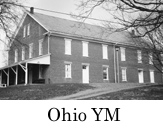The following is the entirety of the memorial.
Brief Sketch of the Life of Rebecca W. Bundy
The subject of this sketch was a daughter of Samuel and Elizabeth (Wright) Smith and was born the 9th of First Month, 1832. Her parents were concerned to bring up their children in the nurture and admonition of the Lord, being fully convinced themselves of the Truth as professed and promulgated by our early Friends. Rebecca's subsequent life seemed to evince the verity of "Train up a child in the way he should go, and when he is old he will not depart from it". And "as a twig is bent so is the tree inclined." This is an encouragement to parents to seek that help from above that so many worthies of former times did, that they thereby may be enabled to fill up their measures in life's duties toward the rising generation.
Doubtless our friend often felt her weakness and utter inability of herself to see and know how to deport herself so as to be acquitted in the Divine sight, having in her 26th year assumed the delicate and responsible duties devolving upon a step-mother to two sets of children in her marriage to Dempsey Bundy to whom she was very devoted. Later a niece of nine years came to live with them. As time passed on the constant affection of loyalty manifested by these young people even when they were grown up and had families of their own was a source of comfort to her. Just about twenty years after her marriage she was called upon to part with her beloved husband rather suddenly, which was a keen stroke, her father having deceased about a month before. So she was left very lonely though not without the consolation in the belief that the dear ones were gathered to the better country which they had sought.
She was at times led to keep some memoranda of the exercises of her mind of which the following are examples. "Not at meeting today as mother's health seems to require someone to stay with her. Have spent part of the time in looking over my diary which brings many things to view, but in summing up all the different states and feelings spoken of, I am convinced that there is no way to go forward in a spiritual walk but by attention to the Light of Christ inwardly made known in the heart, and that all and everything that dissipates the mind from an obedience to that, must be given up, and we become entirely obedient to the most secret intimations of duty, no matter how contrary to our own wills and the opinions of others."
At another time she says: "When favored with desires though they may be but feeble and faint glimpses of the beauty and excellency of heavenly things, how little do all the pleasures of earth and earthly things seem. Could I but more and more come to know a thirsting for this state, could I but become more weaned from the pleasing things of time and sense by the judgments of the Lord being laid to the transgressing nature in me. I know of nothing more desirable. Oh, that there might be a plain way cast up for me to walk in. Take me, Oh My Father, by the hand and lead me safely through this thorny wilderness, for without thy protecting care and certain guidance I cannot go aright. Accept at this time my poor rebellious heart and create it anew for thy own purposes, and Oh, enable me to persevere. All power is thine and believing that thou art able to convert the barren wilderness into a fruitful field, I yield myself unto thy care and keeping. If on the bended knee in my secret chamber thou constrainest me to supplicate thy name, Oh, enable Me to know indeed that it is at thy command, and Oh, be pleased to renew thy pure and holy Spirit within me that I may not in word or deed do aught to dispel its gentle monitions. Having the light of thy countenance and thy favor what will all the opinions of my fellow mortals avail in judging of my actions? 'Watching daily at thy gates, waiting at the posts of thy doors' may I be found hearing and heeding in every thing thy words of warning or of instruction and now Heavenly Father I again commit myself to thee; do with me what seemeth to thee good, only give a certain evidence that thou art with me, and build me up on the alone sure foundation against which all storms and tempests beat in vain."
About 1880 she was appointed to the station of elder and became a member of the Boarding School Committed in both of which positions she was serviceable, keeping a watchful eye that digressing changes be not allowed to creep in without a warning protest. The influence of the current literature of the time that was often being pressed as so suitable, instructive and entertaining and should be in the library or used as text books was a source of great anxiety to her, as she knew and feared the evil effects of the plastic minds of youth being embued with such reading matter likely to lend a disrelish for the more substantial and especially to that of a distinctly religious character.
As a conscientious matron of the Indian School at Tunesassa, NY for some years her influence and example had an uplifting tendency to the Institution, she being concerned for the best welfare of all about her. Rebecca also filled positions at our Boarding School for some time as well as a shorter period in Scattergood Boarding School in Iowa with credit. We can all appreciate that the every day life and conversation of caretaker in such schools are of great importance.
Her concern and attitude relative to the manner of holding meetings for discipline as well as on committees emphasized the importance of seeking Divine direction in all things coming before the meeting or committee, including not judging matters as we would temporal concerns; but each seek the will of God and speak or be silent according to the conviction of Truth manifest at the time and that there should never be partiality in judgment under any circumstances; an incident in point she would refer to in the life of an eminent minister of a former generation whose son was under dealing for some outgoing. When the judgment of the Monthly Meeting was about to be placed on the deviation, he arose and said, in the consideration of best things he knew no man after the flesh and united with the judgment of the meeting, or words to that effect.
At one Yearly Meeting a subject having been sent in from men's meeting had been united with by quite a number, though not without a protest from some exercised ones, amongst whom was RWB, the clerk having disposed of the matter as many desired but had not yet sent the decision to men's meeting and whilst the clerk was engaged on other business those feeling uncomfortable being still exercised that the right thing should be done and Truth prevail, the subject was again referred to, and the decision reversed to the relief of the burden-bearers.
At another Yearly Meeting a subject had been passed on contrary to the judgment of some of the more prominent Friends who were much exercised by it, when a Friend, and elder whose sanction to the measure had helped it forward, arose and took back what she had said in favor of it, after which the whole trend changed and Truth prevailed to the comfort of many hearts.
At another time a minister who was present from a different Yearly Meeting without a minute from his Friends at home desired to visit women's meeting considering the subject RWB greatly to the relief of some of the younger ones voiced their sentiments by remarking "Inasmuch as the Friend has no minute, it would be out of order." When the Friend returned home, he was inclined to criticize the women for turning aside his service, when a valuable elder of his own meeting replied, "The women of Ohio are level headed, thou ought to have asked for a minute."
As to her concern relative to what are sometimes called our minor testimonies she leaves a note of her feelings, thus: "In looking over our meetings and hearing the answers to our queries read, it is apparent that much weakness prevails in the support of many of our Christian testimonies among which a deviation from simplicity in dress forcibly meets the eye and which is almost invariably followed by other and perhaps greater departures from the simplicity which Truth requires. There seem to be many now-a-days who are endeavoring to persuade us there is nothing in these little things, as they are willing to call them, and whose example would enforce that doctrine not only among the youth of our society but those more advanced, who may have little children or young persons under their care. To such as these I would query, shall we lay aside the concerns of our early Friends on this account, many of whom were brought up in all the fashions of the age in which they lived and thus had an opportunity of proving the evil tendencies of such compliance with the spirit of the world. But who forsook them all when visited by the unflattering witness in the heart which showed them that their peace consisted in renouncing them. Shall we also set at naught the experience of faithful men and women of more recent times who have not failed to warn and entreat us to beware of these things?"
From the time she left Tunesassa in 1894 till her death she made her home with her niece who had lived with her from childhood. She was favored with good general health with little exception until 1920 in Third Month when she was suddenly prostrated both in body and mind so she became a care the rest of her days, the greater part of that time under a nurse. Her mind was much like a child, being dependent on others for her needs; but she was not entirely confined to her bed, but cheerful and thankful for her many blessings, saying at one time, "I am wonderfully cared for." So it was really a pleasure to wait on her. While sitting up, she spent the time mostly in reading, which had become a habit with her, reading for hours. Such books as Mildred Ratcliff's Journal, Ann Branson’s, Sarah (Lynes) Grubb, Musings and Memories, Margaret Fox, etc. became her companions. Her memory was such she could not retain long, so read things over and over with apparently equal interest. It was found, however, that it was not best for her to read books or papers, the contents of which were known to be at variance with her belief when well, as it caused considerable excitement and seemed a hurt to her, so was avoided. This showed an evidence of her continued conviction of the Truth, although her mind became so impaired. A few months before her close, a Friend calling to see her among other things she remarked to her visitor, "All will be well in the end." As time went on her powers gradually weakened and about the 1st of the year 1923 she was taken much more poorly and from that time on she was confined to her bed till the close came on the 14th of 9th Month she quietly passed away in her 92nd year, we reverently believe to join the just of all generations in ascribing glory and honor to Him whom she loved and endeavored to serve. |






